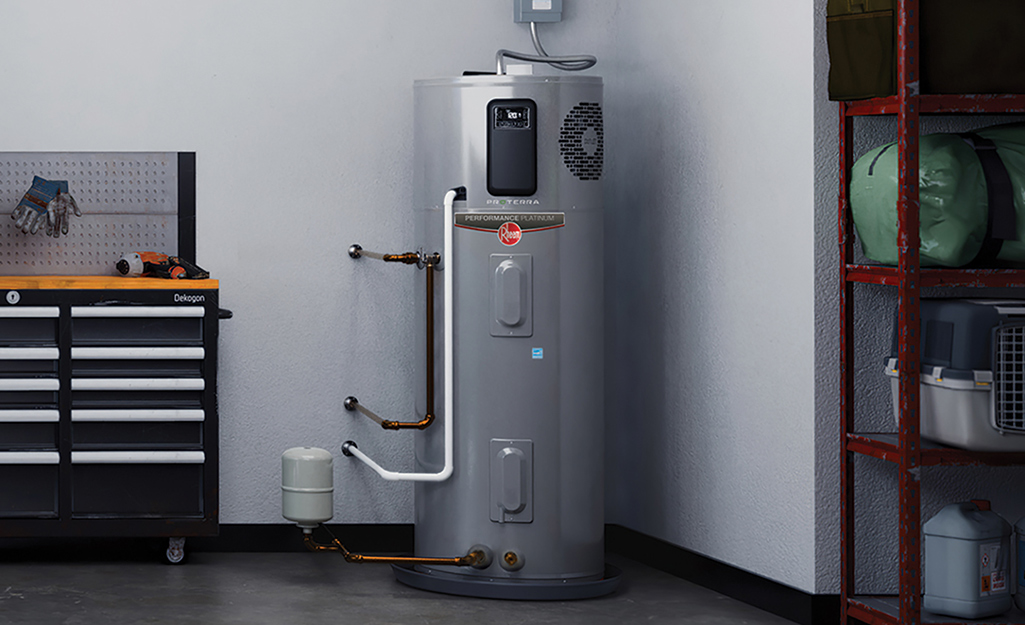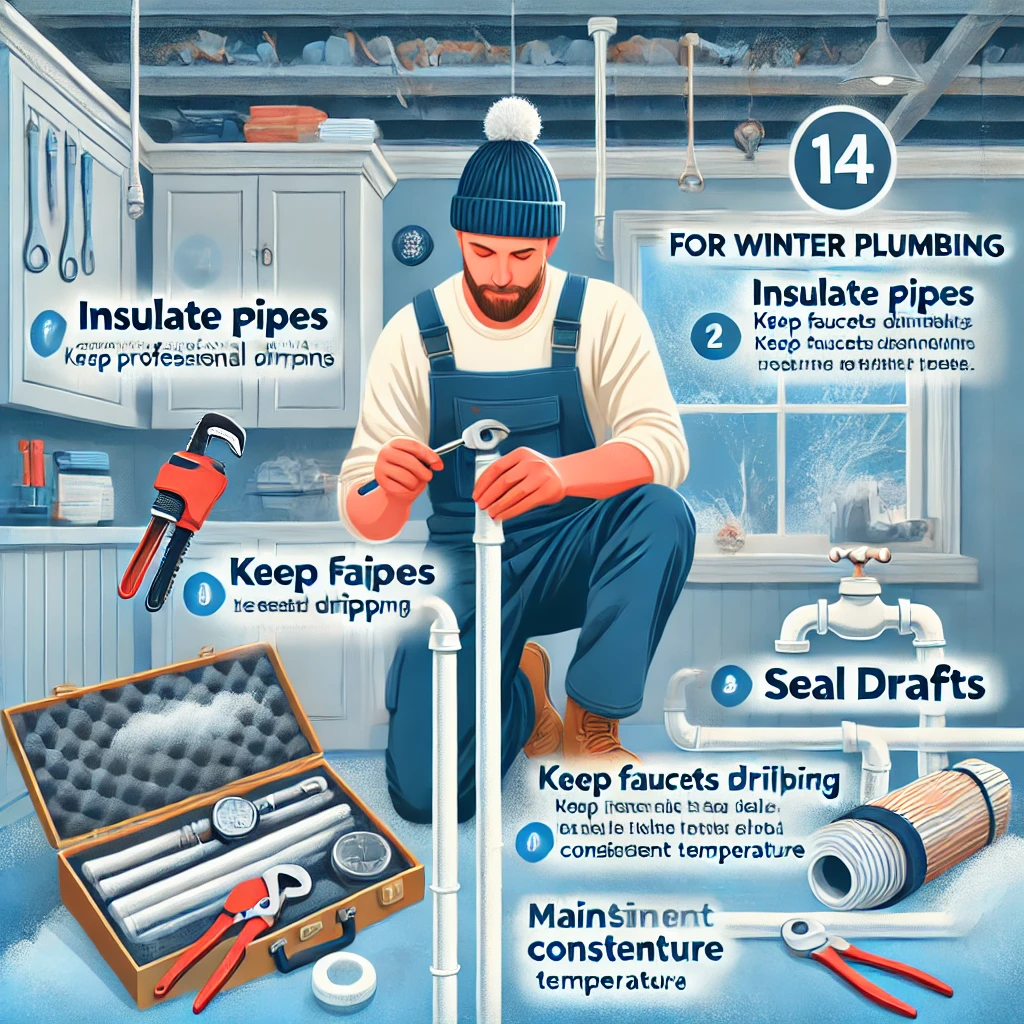Winter is a challenging season for plumbing systems, freezing temperatures and increased water usage during the holidays can strain pipes and fixtures. To avoid costly repairs and inconvenient breakdowns, it’s essential to prepare your plumbing system for winter. This comprehensive winter plumbing maintenance checklist will help homeowners protect their pipes, prevent common issues, and ensure smooth operation throughout the cold season.
1. Inspect and Insulate Pipes
Frozen pipes are a common winter plumbing problem, often leading to bursts and costly water damage. Start by inspecting your home’s pipes for vulnerabilities and insulating them as needed.
- What to Do:
- Identify exposed pipes in unheated areas like basements, attics, crawl spaces, and garages.
- Use foam pipe insulation, heat tape, or fiberglass wrap to protect these pipes.
- Pay extra attention to outdoor pipes and hose bibs, as they are particularly prone to freezing.
- Pro Tip: Seal gaps or cracks near pipes with caulk or foam insulation to block cold drafts.
2. Disconnect and Store Garden Hoses
Leaving hoses connected to outdoor faucets can trap water inside, leading to freezing and potential damage to the faucet or pipes.
- What to Do:
- Disconnect all garden hoses from outdoor spigots.
- Drain any water remaining in the hoses and store them indoors.
- Pro Tip: Install insulated faucet covers on all outdoor spigots for extra protection.
3. Check the Water Heater
Your water heater works overtime during the winter, supplying hot water for showers, laundry, and dishwashing. A malfunctioning water heater in cold weather can be uncomfortable and inconvenient.
- What to Do:
- Flush the water heater tank to remove sediment buildup that can reduce efficiency.
- Test the temperature setting to ensure it’s around 120°F (49°C), which is optimal for energy efficiency and safety.
- Inspect the anode rod for corrosion and replace it if necessary.
- Pro Tip: If your water heater is in an unheated space, insulate it with a water heater blanket to improve efficiency.
4. Test the Sump Pump
Homes with basements or crawl spaces often rely on a sump pump to prevent flooding. Freezing temperatures can cause sump pumps to fail, leaving your home vulnerable to water damage.
- What to Do:
- Test the sump pump by pouring water into the sump pit to ensure it activates and pumps water properly.
- Check the discharge line for clogs or freezing and clear any obstructions.
- Insulate the discharge line to prevent it from freezing.
- Pro Tip: Consider installing a backup sump pump or battery-powered system in case of power outages during winter storms.
5. Keep Faucets Dripping
A slow trickle of water through faucets can prevent standing water from freezing inside pipes, especially during extreme cold snaps.
- What to Do:
- Allow a small stream of water to flow from faucets connected to pipes at risk of freezing.
- Use both hot and cold water taps to keep water moving in both supply lines.
- Pro Tip: Direct dripping faucets into a container to collect water for later use, reducing waste.
6. Seal Drafts Around Pipes
Cold air seeping into your home can quickly freeze pipes, especially those running along exterior walls. Properly sealing drafts is an effective way to maintain warm temperatures around plumbing.
- What to Do:
- Inspect areas where pipes enter or exit the home, such as around the foundation, walls, or floors.
- Use weatherproof caulk or expanding foam to seal any gaps or cracks.
- Pro Tip: Check under sinks for cold drafts and seal cabinet edges if necessary.
7. Inspect and Maintain Drains
Winter holidays often mean more cooking, cleaning, and entertaining, which can lead to clogged drains. Prevent blockages to keep your plumbing flowing smoothly.
- What to Do:
- Avoid pouring grease or oil down the drain, as they can solidify and cause clogs.
- Use strainers in sinks and tubs to catch debris like food scraps and hair.
- Clean drains with a mixture of baking soda and vinegar or a commercial drain cleaner.
- Pro Tip: Schedule professional drain cleaning if you’ve experienced recurring clogs.
8. Locate Your Main Water Shut-Off Valve
Knowing where your main water shut-off valve is located can save you from extensive water damage in case of a pipe burst.
- What to Do:
- Identify and clearly mark the location of your main water shut-off valve.
- Ensure the valve is operational and free of rust or corrosion.
- Pro Tip: Teach everyone in your household how to turn off the water supply in an emergency.
9. Check for Leaks
Even small leaks can worsen during the winter, causing water damage and higher utility bills. Conduct a thorough inspection of your plumbing system.
- What to Do:
- Check faucets, pipes, and joints for signs of leaks, such as drips, moisture, or rust.
- Pay special attention to areas prone to freezing, as expanding ice can exacerbate existing leaks.
- Fix minor leaks immediately or call a plumber for professional repairs.
- Pro Tip: Monitor your water bill for unexplained increases, which may indicate hidden leaks.
10. Maintain a Consistent Indoor Temperature
Sudden drops in temperature inside your home can increase the risk of frozen pipes, especially in unheated areas.
- What to Do:
- Keep your thermostat set to at least 55°F (13°C), even when you’re away from home.
- Open cabinet doors to allow warm air to circulate around pipes under sinks.
- Pro Tip: Use space heaters in particularly cold areas, but follow safety guidelines to avoid fire hazards.
Bonus Tips for Holiday Plumbing Demands
The winter season often brings increased use of plumbing systems due to holiday gatherings. Be prepared for extra demand on your system.
- Use a garbage disposal carefully: Avoid overloading it with tough or fibrous food items like potato peels or bones.
- Stagger water usage: Run dishwashers and washing machines at off-peak times to maintain water pressure.
- Have a plumber’s contact info ready: Quick access to a reliable plumber can save time and stress in emergencies.
Conclusion
Winter plumbing maintenance is essential for keeping your home’s plumbing system in top shape during the coldest months of the year. By following this checklist, you can prevent common winter issues like frozen pipes, leaks, and water heater malfunctions. Taking proactive steps now will save you time, money, and stress, ensuring a trouble-free winter season.
If you encounter any serious plumbing issues or need assistance with winter preparations, don’t hesitate to call a professional plumber. They can provide expert advice and solutions to protect your home throughout the season.






Leave a Reply